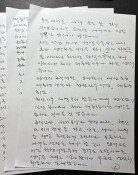The virtue of seeking forgiveness before justice
The virtue of seeking forgiveness before justice
Posted January. 01, 2025 07:57,
Updated January. 01, 2025 07:57
“I will forgive my father in the name of justice," says Ye-seung (Park Shin-hye), who grew up and became a lawyer in director Lee Hwan-gyeong's 2013 film "The Miracle in Cell No. 7," in a trial while pleading for a retrial of his father Yong-gu (Ryu Seung-ryong), who had been falsely accused and executed.
Yong-gu, who entered Cell No. 7 on the heinous charge of rape and murder of infants, is a loving father with a 6-year-old intelligence. By his conviction, he is unforgivable, and even the felons do not treat him like a human, but his inmates who have witnessed Yong-gu's love for his daughter next to him (even the chief of security) realize that he had been framed. Set in a prison yet remembered as a rollercoaster of laughter and tears, the movie attracted a whopping 12 million viewers in South Korea when it was released. Although the film is remembered as a comedy and a human drama, after all, this comes down to a question of justice.
Having confessed to a crime he didn't even commit as he faced threats from the police chief who lost his daughter, Yong-gu breaks down in tears, forced to say goodbye to his daughter Ye-seung. "I'm sorry. Please save me." His scream resonates with his audience as it contains a desperate plea sought by an innocent man who did not commit a crime to die for and, therefore, does not need to be sorry. This poignant scene poses a question about justice: isn't there someone else reserved to feel sorry, those who should seek forgiveness on his behalf?
Denying the truth and not asking for forgiveness is like subjecting innocent people to perpetuating pain, as in Yong-gu’s case in the movie. If one did something wrong, one must ask for forgiveness. After all, truth is bound to come to light, and justice will eventually prevail.







